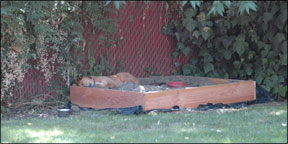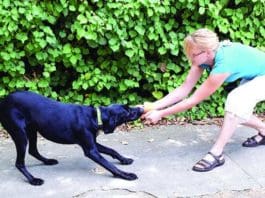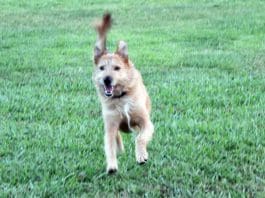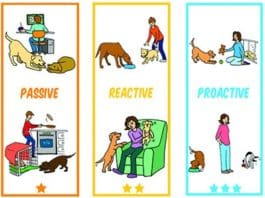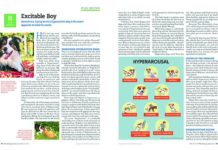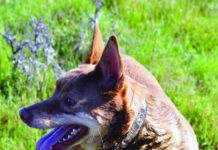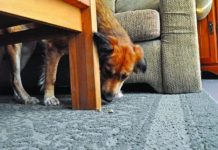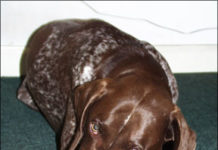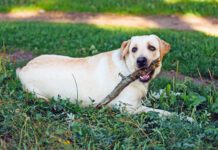Managing Canine Behavior
September can be confusing for dogs who have grown accustomed to the constant attention of human friends over the summer. This is an especially difficult time for puppies, acquired in June, who have never been left alone for as many as eight to 10 hours a day. Suddenly the pup is abandoned by the pack, and an animal who would rarely be alone for long periods in his natural environment is left to his own devices for several hours at a time. Small wonder that this is the time when housetraining commonly breaks down, destructive behavior erupts, human tempers flare, and dogs are either banished to backyard isolation, returned to breeders, or dumped at animal shelters.
Help With Door-Crazy Dogs
you risk "flooding" the dogs
Teach Your Dog To Settle Down
position a mat or bed near you, and invite your dog to lie down there. You can use a food lure to encourage her to rock onto one hip and mark this posture (with the click of a clicker or a verbal marker such as the word Yes!") and a reward.üReward her with small bits of tasty treats for initially short
What Is Autism?
The term Autism Spectrum Disorders (ASDs) describes a group of complex developmental brain disorders whose symptoms may appear in infancy or later in childhood, affecting speech and behavior. ASDs affects an estimated one out of every 110 children, with boys outnumbering girls three or four to one. In the United States, an estimated one out of every 70 boys is diagnosed with autism.
Letters and Corrections: April 2018
There are many ways to add mental stimulation to a simple game of fetch. For example, we can ask the dog to jump onto a platform and lie down before we throw a disc for him. We can ask him to go through an agility tunnel before catching the ball. The important thing to recognize is when the dog is getting over threshold and stopping the game or reducing its intensity until the dog calms down. If you know the signs of hyperarousal, depicted in the infographic in the original article, then you will be more able to help your dog.
How to Deal with a Dog Who Eats Poop
Most of us find a dog's habit of eating feces to be the most disgusting thing that a dog can do. The clinical name for this behavior is coprophagy (pronounced kä - prä - fey - je), from the Greek words copro, which means feces, and phagy, which means eat. The habit is not just revolting to us humans, it's also potentially harmful to the dog's health.
Upper-Level Management
Garbage-raiding, counter-surfing, barking at passers-by ... How do you train your dog to stop his bad behavior? Often, the answer isn’t a matter of training at all!
Nose Work is Great Exercise for Dogs!
When your dog has learned how to search, this makes a great rainy day indoor exercise activity. You can also routinely scatter her meals around the yard so she has to search through the grass to find them; put her on a long line if you don't have a fence. You can also name her favorite toys and have her find them. You can even have family members and friends hide and have her find them.
Dogs and Puppies Chew For a Number of Reasons, Learn to Properly Channel This...
between three and six months of age. While the baby teeth are shedding and the adult teeth are erupting
Working With Obsessive/Compulsive Dogs
The dainty, 18-month-old Cavalier King Charles Spaniel appeared perfectly normal and happy when she and her owner greeted me at the door, but I knew better. Her owner had already advised me over the phone that Mindy was a compulsive “fly-snapper,” and that the stereotypic behavior had intensified in recent weeks, to the point where it was making life miserable for both Mindy and her owner. Indeed, it was only a matter of minutes before I saw Mindy’s expression change to one of worry, then distress and anxiety, as her eyes began to dart back and forth. Her efforts grew more frantic and her demeanor more anxious, and included stereotypic tail-chasing, until she finally ran from the living room into the safety of her crate in the darkened pantry.
Why Does My Dog Chew on Wood?
Wood chewing is fraught with potential veterinary emergencies, from splinters in the mouth to pieces lodged in the gastrointestinal tract and more. So even though it's natures favorite chew toy it shouldn't be your dogs.
Help for the Home-Alone Dog
As soon as the kids went back to school and Carly was left home alone during the day, things in and around the Hoye’s house began to get chewed. Initially, they thought it was just puppy teething, and to save the rugs and furniture (not to mention the hardwood floors and woodwork around the doors and windows in their restored Victorian) the Hoyes started leaving Carly outside during the day. But she soon advanced to chewing the lattice off the sides of the deck and the shingles off the sides of the house.


